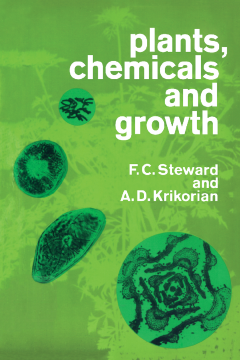
Additional Information
Book Details
Abstract
Plants, Chemicals and Growth investigates natural and synthetic chemicals that control plant growth and development. It examines how plant growth regulators, such as 2,4-D, 2,4-dichlorophenoxyacetic acid, 2,4,5-T, 2,4,5-trichlorophenoxyacetic acid, ammonium sulfamate, indole-3-butyric acid, disodium 3,6-endoxohexahydrophthalate, gibberellic acid, and 2-chloroethyltrimethylammonium chloride, induce biological responses in plants. These responses range from tropism and chemotropism to growth of organs by cell division and enlargement, rhythmic phenomena in growth and development, initiation of lateral organs and problems of phyllotaxy, and the regulatory effects of light and temperature on growth and form.
Comprised of 10 chapters, this volume begins with an overview of chemical regulators and the ways in which they elicit biological responses in plants; how chemical regulation of plants is related to the growth and development of flowering plants; cell growth and cell division; cell cycle; and cellular ontogeny. It then looks at the history and modern concepts of growth-regulating compounds, such as auxins, cytokinins, and gibberellins. The book introduces readers to how chemicals induce growth in quiescent cells; natural sources of growth stimulatory substances; synergisms and interactions of growth regulatory systems; growth-regulating effects in free cell systems; examples of biologically active compounds; the mechanisms of action of plant growth regulators; concepts and interpretations of plant growth regulation; and prospects and problems associated with chemical regulation of plant growth and behavior.
Teachers, biology students, agriculturalists, and researchers will find this book extremely useful.
